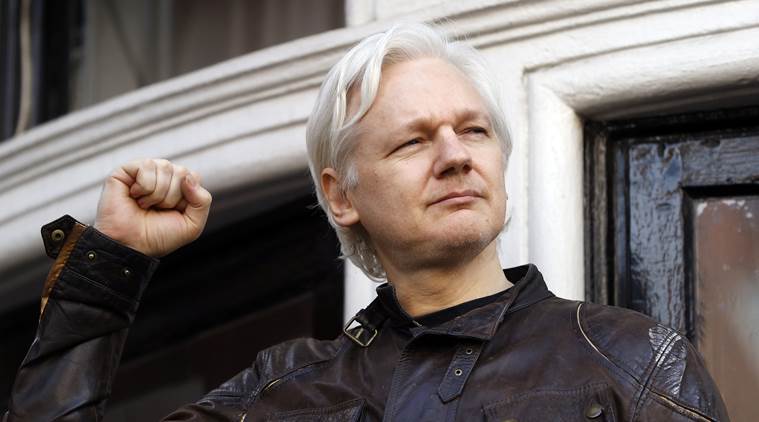 The White House on Wednesday denied an allegation that President Donald Trump had offered to pardon Julian Assange, the WikiLeaks founder who is fighting extradition to the United States. (File)
The White House on Wednesday denied an allegation that President Donald Trump had offered to pardon Julian Assange, the WikiLeaks founder who is fighting extradition to the United States. (File)
Written by Charlie Savage
The White House on Wednesday denied an allegation that President Donald Trump had offered to pardon Julian Assange, the WikiLeaks founder who is fighting extradition to the United States, if he absolved Russia of hacking Democratic emails during the 2016 campaign.
Assange’s legal team told a court in London on Wednesday that Trump had made the offer in 2017 through Dana Rohrabacher, who at the time was a Republican congressman from California.
Stephanie Grisham, the White House press secretary, dismissed the accusation.
“The president barely knows Dana Rohrabacher, other than he’s an ex-congressman,” Grisham told reporters. “He’s never spoken to him on this subject or almost any subject. It is a complete fabrication and a total lie.”
It is not a new revelation that the congressman tried to broker a deal in which Trump would make Assange’s legal troubles with the United States go away if he provided evidence disproving that the Russians had hacked the Democratic emails WikiLeaks published.
But the claim, which came the day after Trump pardoned numerous high-profile white-collar criminals, grabbed attention because a lawyer for Assange portrayed Rohrabacher as acting on Trump’s instructions. Previous accounts have described Rohrabacher as freelancing an idea that he came up with on his own.
On Wednesday, a lawyer for Assange, Edward Fitzgerald, referred in court to a statement by another lawyer for Assange, Jennifer Robinson, describing a purported quid pro quo offer conveyed by Rohrabacher, according to a Daily Beast account of a hearing on what evidence could be admitted at an upcoming extradition hearing.
The statement by Robinson, he said, described “Mr. Rohrabacher going to see Mr. Assange and saying, on instructions from the president, he was offering a pardon or some other way out” of his legal troubles if Assange “said Russia had nothing to do with the DNC leaks.”
The Wall Street Journal reported in September 2017 that Rohrabacher — who lost his seat in the 2018 midterms — was trying to broker a deal for a pardon if Assange produced evidence absolving Russia of the hack. That would have also absolved the Trump campaign of suspicions that it conspired with Russia.
But that article portrayed Rohrabacher as approaching the White House with an idea that he had come up with, not acting as Trump’s envoy. It said that he spoke with John Kelly, Trump’s chief of staff at the time, about the possibility of “a meeting between Mr. Assange and a representative of Mr. Trump, preferably someone with direct communication with the president,” but that Kelly had not passed that message on to the president.
After the Journal article, a local news program for a CBS affiliate in Los Angeles, KCAL, interviewed Rohrabacher. He confirmed the account, saying that “The Wall Street Journal has the whole thing.”
Rohrabacher also said in that interview that Assange “repeatedly told me that the Russians were not involved at all.”
But a later indictment of Russian officials and a lengthy narrative report by special counsel Robert Mueller provided extensive details about how the Russian government went about hacking the Democratic emails. Mueller, however, did not find evidence proving any conspiracy with the Trump campaign.
Assange, who was holed up in the Ecuadorean Embassy in London to avoid extradition to Sweden for a sexual abuse investigation, was arrested and extracted from the embassy in April 2019. It was the same day that the Justice Department unsealed a narrow charge accusing him of a hacking conspiracy with Chelsea Manning, the former Army intelligence analyst who leaked archives of military and diplomatic documents to WikiLeaks.
The next month, the Justice Department significantly expanded the case against Assange by adding charges under the Espionage Act that he solicited, acquired and published classified information. The decision to bring criminal charges for such journalistic activities — a separate question from whether Assange counts as a journalist — was groundbreaking and has surrounded his potential trial with novel First Amendment issues.